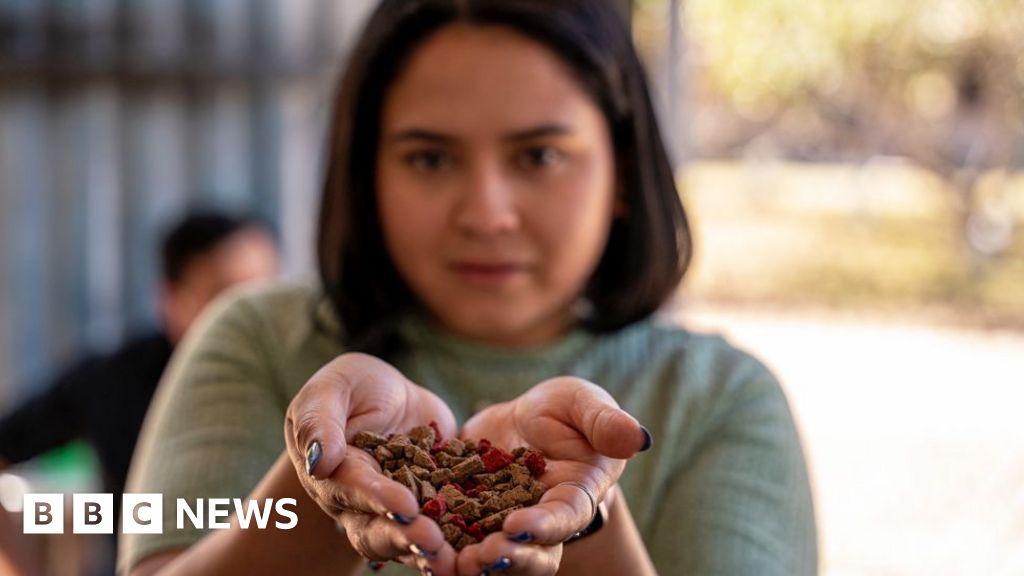[ad_1]
Reporter, Comayagua, Honduras
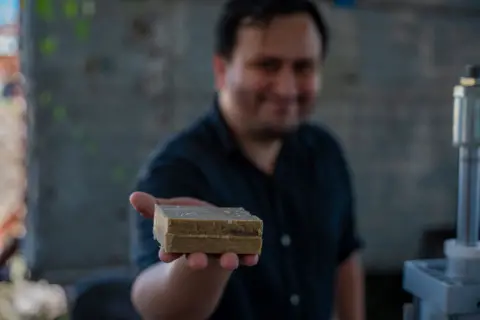 Fritz Pinnow
Fritz PinnowFew 27-year-olds look at used cooking oil and see a green business opportunity to produce soap or dog food.
But that is what Hugo Daniel Chávez, a project manager for the NGO Sustenta Honduras, has done.
“We have so many businesses and domestic practices that create waste, so we are trying to transform waste and give it a second life,” he tells the BBC.
Across Latin America, several million tonnes of cooking oil are consumed every year. It is often used to fry food, mostly chicken, plantain strips, chips and pork.
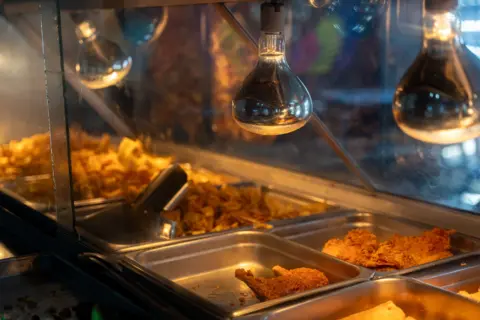 Fritz Pinnow
Fritz PinnowBut reusing and heating it too often – as is often the case in Honduras, where there is a huge black market for used cooking oil – can create compounds which are bad for consumers’ health.
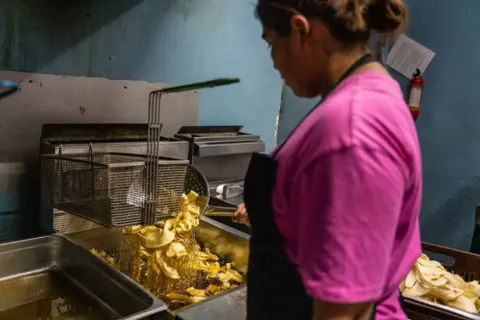 Fritz Pinnow
Fritz PinnowImproperly discarded, it can also have a massive detrimental impact on the environment.
If it is drained down the sink, it can damage pipes and contaminate groundwater, and when it is tossed by the side of the road, it can contaminate freshwater and crops many communities rely on.
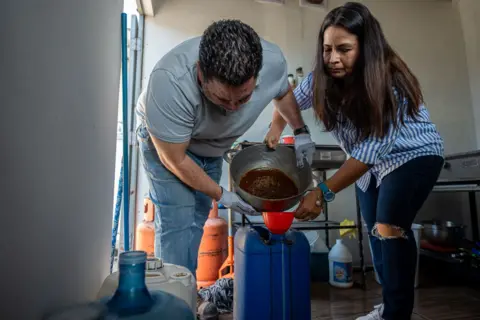 Fritz Pinnow
Fritz PinnowFaced with these health and environmental hazards, the young green entrepreneurs behind Sustenta tried to come up with a solution which would not only give businesses an incentive to dispose of their oil and grease properly, but also turn these waste products into something useful.
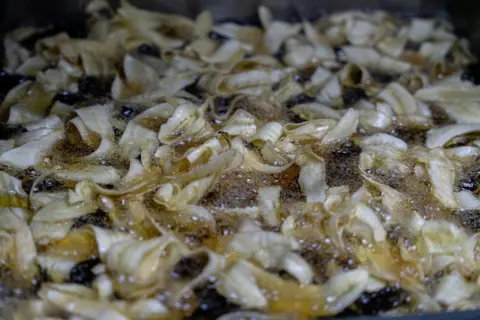 Fritz Pinnow
Fritz PinnowThe NGO’s executive director, Ricardo Pineda, explains that their idea originated from earlier efforts by different companies and organisations to transform used cooking oil into biodiesel. “But in Honduras, we don’t have a market for biodiesel,” he says.
“So we decided to produce products that can do well in our domestic markets [such as soap and dog food].”
In order to make it more attractive to people to get rid of the oil legally rather than sell it to unscrupulous buyers, Sustenta offers to buy the used cooking oil and pick it up regularly from the shops that participate in their project.
Their efforts have gained international recognition, most notably when they were awarded a $20,000-prize as one of the winners of the 2023 Youth4Climate Energy Challenge, a global initiative co-led by the Italian government and the United Nations Development Programme.
Sustenta also receives funding from the embassy of the The Netherlands in the region, which told the BBC that it chose Sustenta because “their project offered an innovative and viable solution, using an enterprising approach which has a social impact”.
“It [their project] not only contributes to lessening the environmental impact through an emphasis on creating a circular economy, but also empowers young people and women – the groups most affected by climate change – and generates green jobs.”
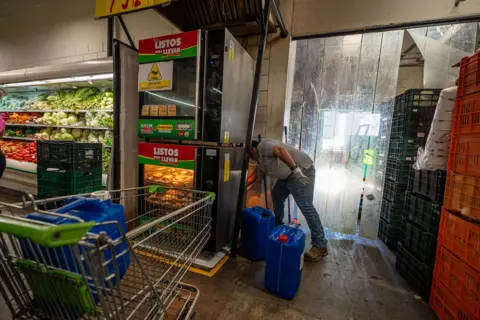 Fritz Pinnow
Fritz PinnowSustenta offers between 2.50 and 3.50 Lempiras (£0.08 and £0.11) per pound of used cooking oil.
And it is not just small businesses it deals with.
In May of 2024, the NGO signed a contract with the Mexican and Central American division of the retail giant Walmart.
This contract guarantees a flow of used cooking oil and grease from all companies related to Walmart to Sustenta, which Mr Pineda says is critical to Sustenta’s project.
“We needed a reliable flow to scale up production. (…) Otherwise, we could quickly run out of used cooking oil, because of the black market that is competing with us,” adds Mr Chávez.
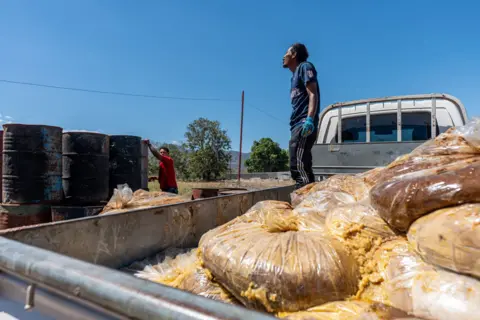 Fritz Pinnow
Fritz PinnowIt then brings the cooking oil and grease to a plant in Comayagua, where they are purified and processed in a reaction known as saponification. This process combines fats or oils with an alkali to produce soap.
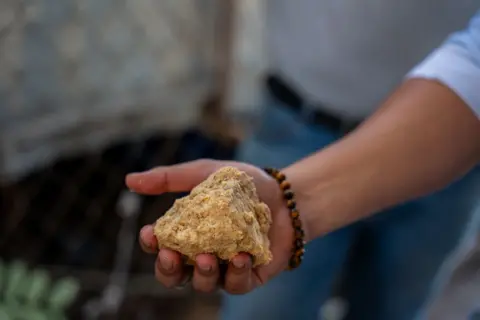 Fritz Pinnow
Fritz PinnowMr Pineda says that Sustenta is keen to develop “a circular ecological system in which we reuse everything”.
“Next to our plant that produces the soap and dog food, someone else has a water purification plant and we use the water that plant cannot purify, its waste so to say, for our water cooling system,” he explains.
 Fritz Pinnow
Fritz PinnowThe idea of teaming up with Walmart, Mr Pineda says, is “to sell the dog food and soap we have refined from their waste at Walmart”.
“They could profit from their own waste and also see the economic value behind circular economies, ” he tells the BBC.
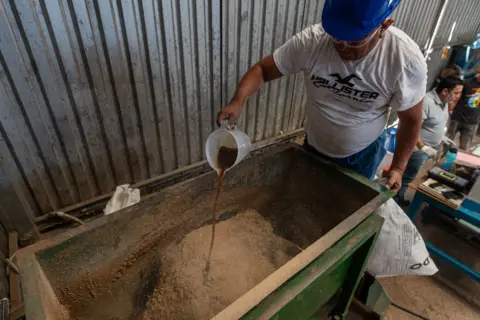 Fritz Pinnow
Fritz PinnowAt 15 lempiras (£0.45) per bar of soap, the project makes a monthly revenue of over 106,000 Lempiras (£3,194.70), which excludes fixed costs like salaries, commission and distribution.
Mr Pineda emphasises that “the money doesn’t stay with us”. “We just help with the implementation of the project and as soon as it’s up and running we seek new opportunities,” he says.
The recycling of cooking oil is just one several projects running simultaneously at Sustenta.
 Fritz Pinnow
Fritz PinnowThe organisation is comprised of young people, all under 30 and averaging 23 years of age, and their youthful enthusiasm and impatience with established ways of doing things has been key to their approach.
“We started as a young group that was sick of the regular ways large institutions handle issues with climate change and the environment,” Mr Pineda says.
“We want to create actual solutions and not sit around only talking about what could be done.”
Their strategy also differs from that of other young environmental organisations in the region, who often focus on a confrontational approach, trying to halt large mining or energy projects and holding politicians accountable for corruption.
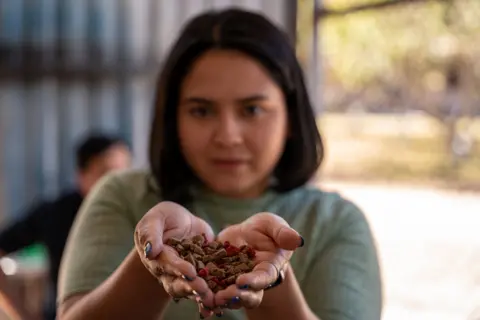 Fritz Pinnow
Fritz PinnowBut Sustenta’s project coordinator, Paola Acevedo, says the two approached are not at odds, but rather complement each other: “This type of [classical] environmentalism is very important and there is no doubt that we need it.”
“We try to focus on solutions, while the others fight on the front lines,” she adds.
[ad_2]
Source link
